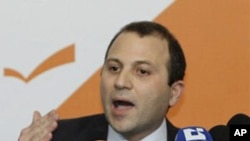Lebanon's unity government collapsed Wednesday after Hezbollah ministers and their allies resigned.
Wednesday's walkout ushers in another political crisis for a country with a long history of volatility and violence. The resignations were announced at a news conference by Energy Minister Jibran Bassil, a member of the Free Patriotic Movement - the key Christian ally of Hezbollah.
In order to pave the way for a new government according to the constitution that will be able to take responsibility for the security and interests of the people, he said, and also by securing the real justice, the ministers are submitting their resignations from this government hoping that the president will accelerate the formation of a new government.
Analysts say their departure could also force the resignation of Prime Minister Sa’ad Hariri and end Lebanese involvement in the U.N.-backed court investigating the 2005 assassination of former prime minister, Rafik Hariri, the father of Sa’ad Hariri.
Mr. Hariri's assassination stunned and polarized Lebanon, where Shi'ites, Sunnis and Christians make up a third of the population.
Mr. Hariri was well liked and backed by many Christians who sympathized with his efforts to try to reduce Syrian influence in the country.
Political analyst Judith Palmer Harik said the ministers resigned in order to force the formation of a new government- one that would end Lebanese support for the international court's investigation into Mr. Hariri's death.
The investigation by the court is likely to name members of Hezbollah in upcoming indictments, which many fear could re-ignite sectarian violence.
But, Prime Minister Sa'ad Hariri refused to halt the investigation and vowed to continue to cooperate.
A diplomatic push by Syria and Saudi Arabia to ease political tensions in Lebanon failed.
Labor Minister Butros Harb expressed concern:
The situation puts us into administrative crisis, he said, and also in a new political crisis which increases complications in the country and does not contribute towards solving any of the problems.
Prime Minister Hariri formed the current national unity government in November 2009, but it has struggled to function amid deep divisions.
Mr. Hariri met in Washington Wednesday with President Barack Obama to discuss the crisis in Lebanon.
After the meeting, the Mr. Obama reportedly vowed to pursue stability in Lebanon. Later in the day, U.S. Secretary of State Hillary Clinton said Hezbollah was attempting to "subvert justice" and undermine stability. She said it "won't work."
Lebanese political analyst Hilal Khashan says Hezbollah is not likely to use its military might to take over Lebanon. In 2008, Hezbollah took over West Beirut in a matter of days. A move like that, he says, will not happen again because Syria will not allow it.
For the Lebanese people, Khashan says the collapse of the government will not result in immediate change because the government has done virtually nothing in months. Government paralysis, he says, is now simply formalized.





